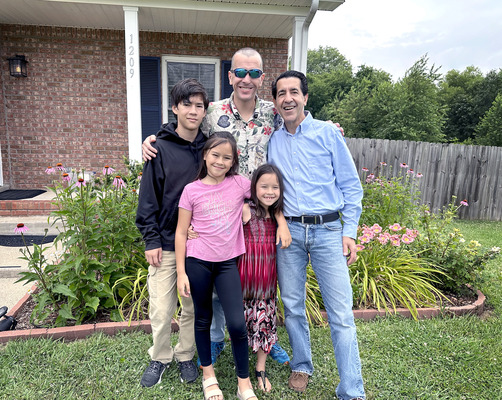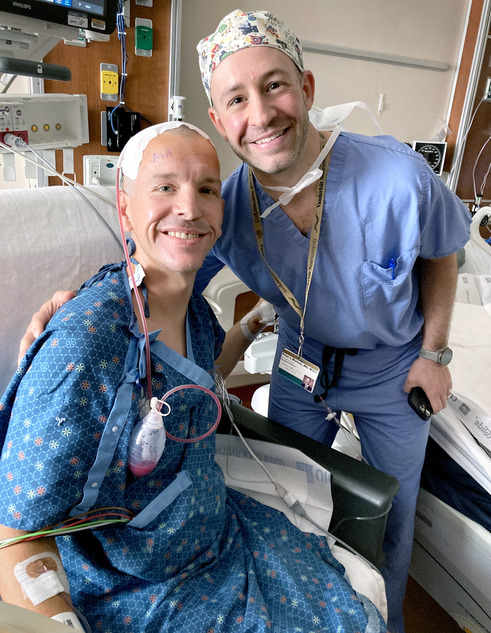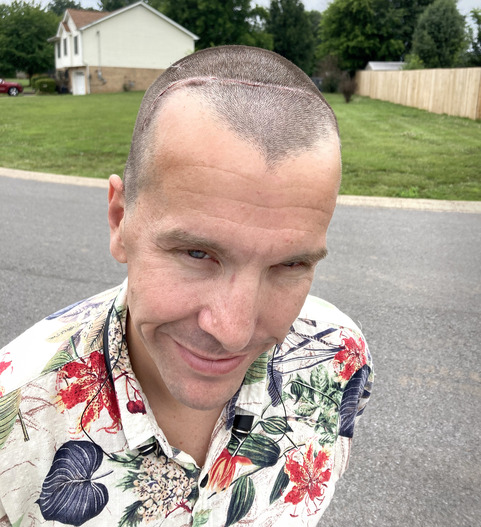
A platform that encourages healthy conversation, spiritual support, growth and fellowship

NOLACatholic Parenting Podcast
A natural progression of our weekly column in the Clarion Herald and blog

The best in Catholic news and inspiration - wherever you are!
The gift of presence when life’s path is diverted
-

Clarion Herald business manager Mark Lombard, above, with his son Matthew and his son’s three children, Ethan, 13; Ava, 10; and Cosette, 8.
By Mark Lombard, Clarion Herald
Photos courtesy Lombard Family
On an early-morning run along Lake Champlain in northern Vermont, I was aglow with gratitude and joy at the beauty of the mountains in the distance, the views of the boats moored in the bay complete with its idyllic mist rising from the cool, 70-degree dawn and the sounds of the morning birds mixed with the lapping of the waves on the shore.How could life get any better, I remember thinking, an old marathoner with his health, still smiling, able to continue hitting the bricks.
Entering our house after the run, I went to check my phone to see and then listen to a voice message left from a family member 1,200 miles away: “Oh, I wish I could reach you. Matthew had a seizure and is unconscious. He is being airlifted to a hospital. Please call as soon as you get this.”
Slow to register
Those few words simultaneously shook me physically and emotionally, maybe for the first time in my life, freezing my reaction in shock until my wife, Mary, hearing the message, said, with urgency befitting the emergency it was, “What are you waiting for? Call.”
I subsequently found out that the Matthew in that message, our 42-year-old adult son living in Tennessee, had been rushed by EMTs to a small local hospital and, by emergency helicopter, to another hospital in a couple-of-hours span where there was an open intensive-care-unit bed available.
What unfolded in the days and weeks ahead, beyond the drama encapsulated in those initial moments, seemed to represent life, as happens to all families at some time, changed dramatically and forever.
A parent’s greatest loss
As I rushed to pack a bag and catch a flight to be with Matthew as he faced the greatest existential crisis of his life, I was left with the screaming inside my head of a most random combination of thoughts – sometimes connected, too often conflicting – about one’s longevity, ties connecting family, the grandchildren and what their future would be like, the prospects of what life would be for the son I raised, if indeed it would continue, and selfishly, I suppose, the loss I would experience in the worst-case scenario without his humor, his quick mind, his creativity, his expanding my view of the world, his sheer and encompassing presence in my life.
I thought about the idea of the greatest loss said to befall a parent is that their child dies before them. I don’t know that I ever really thought that was something I would have to face. While there was a time when Matt was rushed to a hospital from a mountain-skiing accident and another when the Coast Guard was called when he was out on a sailboat as a teenager, this situation seemed qualitatively different, and the hours and days worrying about whether he would survive made that loss seem more likely.
Matthew has always been healthy, and, in fact, he felt this spring that he felt the healthiest he has ever been, as he was running several times a week and working out at his local gym. We would trade the stats of our running exploits and our diet and exercise regimens with each other, which made wrapping my head around all of his possible health outcomes difficult to square.
Even after getting the news, at the same time as Matthew did from a doctor that first day – that he had a brain tumor the size of a large egg sitting on the right side of his brain – I was upbeat. I expressed a positive outlook that he was alive, fully conscious and in full control of all his physical functionality and that the doctors available to him at Vanderbilt Medical Center were some of the best in the world. It was almost as if I couldn’t bring myself to think about what shape Matthew would be in after brain surgery and the long-term prognosis even if the tumor was removed successfully. Instead, I found myself trying to somehow manifest in my thoughts what I hoped, what I needed to be reality.
Looking back at those first days, I’m not sure how helpful my uneducated thoughts were, especially as Matthew was feverishly looking to YouTube and Google searches and the abundance of Internet support groups to find whatever information and personal testimony he could of others who have experienced similar challenges.
I found very quickly that providing parental pontificating platitudes like the ones I used – “stay positive” or “one day at a time” – or those I didn’t – “God will provide” or “let’s look at the bright side” – had limited appeal and really rang hollow to his experience of facing his mortality.
Matthew, with whom I have always enjoyed and cherished an open, and, at times, brutally honest relationship, told me he did not want and did not find helpful or supportive my expressing positive thoughts for positive thoughts’ sake. He found it a dodge and an impediment to clear thinking and careful, sober strategizing needed for his “changed life.”
And maybe the best parenting I provided was just being present, including: jumping on the next plane and arriving at his side just as his doctor was giving him results of a CAT scan; sleeping in the recliner chair at his hospital bedside for seven days over two weeks; keeping things light to honor the promise he insisted upon to continue to find humor and even sarcasm in the midst of potential life-ending tragedy; and, then, just listening, with as deep a sense of empathy I could muster, as he talked about something I never have had to deal with.
I also learned something about empathy for parents whose children have life-threatening health issues or who have overdosed on drugs or who are far away and deployed in a war zone. While I thought I was being empathetic to others experiencing such news in the past, maybe I was just distant enough to count my blessings that I never had to wrestle with the emotions, feelings, worry and anxiety that such a revelation brings. It is a burden that drags you down with a certain density that only can be known when it is actually felt, never vicariously.
 ‘My concern is the kids’
‘My concern is the kids’I had seen Matthew through about a dozen surgeries from a birth defect from the time he was almost two months old to 18 years old at the time of high-school graduation, so I was not unaware of being at his hospital bedside.
But this was very different, as he was not alone in that bed before and after surgery. He carried his 13-year-old son Ethan, 10-year-old daughter Ava, and 8-year-old Cosette with him.
“I still have responsibility,” he reminded me of what was weighing on him. “I still have a duty to them.”
There was something in that statement that revealed his core, and maybe that of most parents. It was that sense that a parent, even when staring at his very survival, must juxtapose what is in his personal best interests with that of his children, especially as the primary caregiver.
Matthew acknowledged that he was so shocked that his concern was focused on his care not for himself but for others he was potentially going to leave behind.
“You know, Dad,” he shared, “at the end, I’m not going to know,” what it’s like to die, what that loss is going to feel like.
That moment was not the first time I have been stopped dead in my tracks, no pun intended, by an observation and an utter self-awareness of the moment Matthew expressed. In that quiet, I felt an enormous pride a father can only feel of the man his son, when all life’s chips are down, can feel.
I could only marvel that his thoughts and concerns had to do with how everyone’s life in his nuclear family and our extended family was going to be changed – for some of us, fundamentally and irrevocably – during the process of his treatment and likely earlier than expected demise. He so worried about being a source of pity, about people looking at him as if he were already among the departed, and not as a person with years left, though with fewer years than he had expected just a couple of months ago.
Love of the father
On our hour-long trip by car on the day of his surgery – in the midst of his concerns about his three children and my wife’s and my grandchildren – he and I broached a discussion about the love of a father for his children and the responsibilities that go with that.
He reflected that he could not understand those who suggested to him in the days prior to surgery that his tumor was God’s will. What kind of God visits such a potential life sentence on anyone, he asked.
I shared with him my belief that God as the creator of life and its bounty is not the author of misery, though God also is not the shield from every pain or malady. Like the parent each of us hopes to be during the most challenging circumstances of a child’s life, God is there as a support, an example of right action, a source of strength and a guide where we can become the best version of ourselves while proceeding on a dangerous, unknown path.
As the New Testament reveals, God the Father did not intervene on Jesus’ behalf to prevent the bearing of the pain and humiliation of crucifixion. Neither can we fathers or mothers, lacking God’s omnipotence, intervene to stand in the way of death, which comes to all sons and daughters at some point.
The agony of waiting
Maybe even tougher for Matthew than the initial news of the tumor was the waiting for the final results as to what the tumor removed from his skull was and what that meant for his life expectancy.
He took a more stoic, philosophical approach to what the future held for him. He would, he said, deal with whatever cards were dealt. But he wanted to know what he could expect, supported with “science” and statistics about the lethal qualities and consequences of having whatever was determined to be the specific makeup of the tumor.
Frustration mounted as the one-week to 10-day wait for the diagnosis grew to almost three weeks, due likely to the Fourth of July celebrations and the complexity of the multiple tests done on the frozen, gelatinous sectioning of the tumor.
“Just tell me!” Matthew said in utter frustration, before the results were revealed. “The waiting is worse (than any diagnosis). Let me get back to life, whatever it will be.”
And when those results came, the prognosis did, in fact, point to a slow-growing brain cancer. While 90-95% of the cancer likely was removed, some cells, it is thought, still linger in his brain and are expected to grow more aggressive over time. Matthew’s medical condition carries with it an average life expectancy of 11.6 years. Radiation is beginning for six weeks, followed by likely a year of chemotherapy with regular CT and/or MRI scans monitoring any further growth of cancerous cells.
While I did all I could – not successfully, I should note – to hold back the tears and expressions of sadness when he shared the news by FaceTime, Matthew’s reaction again stunned me.
“I feel good,” he said, explaining that he was so grateful to be given solid information, not unfounded, unsupported hope. The neuro-oncologist “gave me actual data,” he added. “I now know what I can expect the future to look like.”
 What lies ahead?
What lies ahead?Matthew and I have had a good number of opportunities to talk in person and by telephone about this surprise, this “gift” growing inside his head that no one wanted and could not be sent back marked “Return to Sender.”
There had been, since that first day of the seizure and news of the tumor, all sorts of possibilities, ranging from it being completely benign to levels of aggressive growth with corresponding shortened life expectancy and including varieties of radiation and chemotherapy, dependent on the genetic makeup of the tumor.
While I have had many friends and family members facing and dealing with cancer, I had no idea of the complexity and the science of developing a completely individualistic treatment plan unique to the DNA code level for the patient. It was one of the pluses we acknowledged together in the face of the horror staring at him. I’m learning through him what is possible within medical expectations. And, as he noted, if he is able to exceed that probable life expectancy, then “that will be great!”
That sense of gratitude for things small and great, and acceptance of what is to come today, tomorrow and well into the future – as well as the truth that no one has the power to hold onto life indefinitely – undergirds our journey individually and together.
We even talked about scriptures, in particular the passage (Mk 13, Mt 25) quoting Jesus about not knowing the time nor the place when the kingdom of God comes, and its relevance to his own situation of being given this glimpse about his earthly ending.
He reflected on how he was focused before the tumor was discovered on living an additional half a century, with two grandmothers still living into their 90s, and now maybe having to look forward to one-tenth or one-fifth of their life span.
And even in those first days in the hospital, he was able to reflect that whatever time he had, he needed to put to use not in the pursuit of amassing greater wealth for its own sake or purchasing luxury items and consuming, but rather on connections with those he has professed a real tie, a love. This threat to his future was, in a sense, a wake-up call, despite my seeing him as an amazing father and son.
That is a poignant reminder to me about priorities that have lasting value beyond one’s lifetime, about remembering the challenges others are facing, about celebrating each moment of each day we are gifted, about the demands of real love and caring and about presence.
Presence is a real challenge. How am I going to be present to him? To our grandchildren? Is it on my terms, on what I am going through, what I am feeling, looking at him through my lens of beliefs? Am I going to tiptoe around him for fear of somehow raising what he will now have to face each day for the rest of his life? Am I going to try to fashion my conversations with him with just “happy talk,” as he describes it, so as not to burden him?
I will hopefully be able to man up and respond to this amazingly strong man, this son of mine to whom I am so proud to be connected, as he would want me to. Not to diminish him as in some way a walking dead man or even dying, any more than we all are, as in any way less than he was before the diagnosis, the surgery, the prognosis and the treatment.
No, Matthew and I agree on the need to find new ways to connect, to use the time we have each day NOW not at some later date down the road to really live and celebrate the gift of the life we have.




